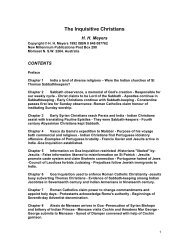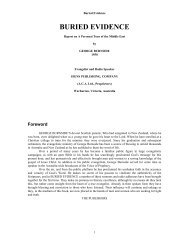Battle of the Bibles - Present Truth
Battle of the Bibles - Present Truth
Battle of the Bibles - Present Truth
You also want an ePaper? Increase the reach of your titles
YUMPU automatically turns print PDFs into web optimized ePapers that Google loves.
which <strong>the</strong>y <strong>the</strong>mselves have shortened" ("Anti-Nicene Fa<strong>the</strong>rs", [Scribners] Vol. I pp 434,<br />
435).<br />
Justin Martyr was born in Greece <strong>of</strong> pagan parents in <strong>the</strong> very year in which John<br />
<strong>the</strong> Revelator is thought to have died (100 AD). He is credited with conversion to<br />
Christianity and became a Christian teacher, but could not entirely divest himself <strong>of</strong> his<br />
hea<strong>the</strong>n upbringing and so he clung to some heretical ideas.<br />
One <strong>of</strong> his pupils was <strong>the</strong> famed Tatian, who built upon <strong>the</strong> heresies <strong>of</strong> his<br />
teacher by embracing Gnostic philosophy. He wrote what is known as <strong>the</strong> Diatessaron<br />
meaning "four in one", which he claimed harmonised with <strong>the</strong> Gospels. But <strong>the</strong>y were so<br />
severely corrupted that a Bishop <strong>of</strong> Syria was astonished to find some <strong>of</strong> his<br />
parishioners actually coming to believe in <strong>the</strong>m as though <strong>the</strong>y were genuine Scriptures.<br />
He was so alarmed that he threw out some two hundred copies! ("Encyclopedias",<br />
"Tatian").<br />
As <strong>the</strong> way <strong>of</strong> pupils who emulate <strong>the</strong>ir mentors, one <strong>of</strong> Justin Martyr's pupils who<br />
came to be known as Clemens <strong>of</strong> Alexandria, did just that. In his college which he<br />
founded, he determined that he would not teach true Christianity, but would mix it with<br />
pagan philosophy. Commenting on this J.W. Burgon, DD says:<br />
"He [Clemens] habitually mistakes apocryphal writings for inspired Scriptures"<br />
Burgon attributes Clemens' careless attitude toward Scripture to his familiarity with <strong>the</strong><br />
works <strong>of</strong> "Marcion and <strong>the</strong> rest <strong>of</strong> <strong>the</strong> Gnostic crew" ("Revision Revised", p 336).<br />
Naturally, such teachings continued to be reflected in following generations. One<br />
<strong>of</strong> Clemens' pupils, Origen, had a penchant for allegorising <strong>the</strong> Scriptures to <strong>the</strong> extent<br />
that he came to <strong>the</strong> place where he could say:<br />
"The Scriptures are <strong>of</strong> little use to those who understand <strong>the</strong>m as <strong>the</strong>y are<br />
written" ("McClintock and Strong Encyclopedia", article: "Origen").<br />
With such observations, one is led to ponder just what use for Scripture Origen<br />
had in mind. Certainly it was not what <strong>the</strong> Author <strong>of</strong> Scripture intended, for had not God<br />
said:<br />
"All scripture is given by inspiration <strong>of</strong> God, and is pr<strong>of</strong>itable for doctrine, for<br />
repro<strong>of</strong>, for correction, for instruction in righteousness; That <strong>the</strong> man <strong>of</strong> God may be<br />
perfect, throughly furnished unto all good works" (2 Timothy 3:16, 17).<br />
It can readily be seen that Clemens' philosophy would enable <strong>the</strong> Scriptures to<br />
be interpreted to support practically any belief or dogma capable <strong>of</strong> being devised by<br />
man. Thus Origen came up with <strong>the</strong> notion that <strong>the</strong> soul existed from eternity. After<br />
death, it migrated to ano<strong>the</strong>r form <strong>of</strong> life commensurate with one's conduct during <strong>the</strong><br />
human life span (shades <strong>of</strong> Buddhism!). His fantasies led him to believe that even <strong>the</strong><br />
stars and planets had souls which, like men, were on trial to learn perfection. ("Our<br />
Authorised Bible Vindicated", p 18).<br />
So we see a new type <strong>of</strong> Bible emerging which Wilkinson describes as "an<br />
adaptation <strong>of</strong> <strong>the</strong> Word <strong>of</strong> God to Gnosticism ".<br />
The learned Dr. Scrivener summed up <strong>the</strong> effect <strong>of</strong> this tragic prostitution <strong>of</strong><br />
God's Word, when he wrote some sixteen centuries after Clemens:<br />
"It is no less true to fact than paradoxical in sound, that <strong>the</strong> worst corruptions to<br />
which <strong>the</strong> New Testament has been subjected, originated within a hundred years after it<br />
was composed; that Irenaeus (AD 150), and <strong>the</strong> African fa<strong>the</strong>rs, and <strong>the</strong> whole Western,<br />
with a portion <strong>of</strong> <strong>the</strong> Syrian Church, used far inferior manuscripts to those employed by<br />
Stunica, or Erasmus, or Stephens thirteen centuries later, when moulding <strong>the</strong> Textus<br />
Receptus" ("Introduction to New Testament Criticism", 3rd Edition p 511).<br />
3





